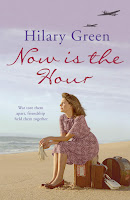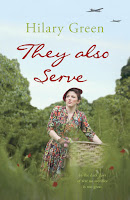Very little has been written about the people who helped to raise morale, both among the troops and the civilians, by providing entertainment during the war. A few names come immediately to mind – Vera Lynn singing 'We'll Meet Again', Ann Shelton, who was the 'Forces Sweetheart', Gracie Fields – but no one over the age of seventy remembers what ENSA stood for. The Entertainment National Service Association was the brainchild of impresario Basil Dean and actor Lesley Henson and brought together both professional and amateur entertainers in a uniformed service.
 |
| Gracie Fields with an RAF Orchestra - Public Domain Image |
There were singers and dancers, actors and musicians, all of whom had been thrown out of work by the closure of the theatres in London and the many coastal resorts where they normally put on summer shows. Now they performed in munitions factories, garrison theatres, and village halls, helping to bring a little relief from the ever-present danger and the gloom of rationing and the blackout. In the months after the debacle of Dunkirk there were no front line troops to entertain, so they concentrated on keeping up morale at home, but groups were despatched to outlying units in place like Iceland and the Orkneys. At that time a directive went out ordering all the female performers to wear trousers when visiting naval ships, to preserve their modesty when climbing ladders up to the deck.
During the preparations for D-Day thousands of British and American troops were quartered along the south coast of England. They were confined to barracks, to preserve the secret of the forthcoming invasion, so ENSA companies were sent to entertain them. In an attempt to ensure that they had no idea where the camps were situated, they were made to travel in buses with the blinds down; but since most of them had been used to performing in summer shows at coastal resorts and so were familiar with the whole area this was a futile exercise.
One week after the D-Day invasion, the first ENSA company crossed the channel and they were soon followed by others. Each was a party of six, with their own transport, portable stages, lighting and costumes, and escorted by an army officer. The performances took place in tents and bomb damaged buildings across Europe. The players slept in any house they could find that still had a roof and they often performed within sound of the guns. In spite of this it was still known, to some of those forced to attend its less successful performances, as Every Night Something Awful!
 |
| An ENSA concert party entertaining troops from the steps of a chateau in Normandy, 26 July 1944 -Public Domain Image |
ENSA was not the only organisation putting on shows for the troops. Soon after conscription began another far-sighted man took an important initiative. Colonel Basil Brown was an Army Welfare officer who realised that all round the country, in the period known as the 'phoney war' when hostilities proper had not commenced, there were talented performers, many of them professionals, who were languishing in army barracks square bashing and peeling potatoes. He sent out scouts to search for such people and had them seconded to the Central Pool of Artistes, which later became known as Stars in Battledress. They were formed into companies according to their particular fields of expertise. Some gave variety performances, others performed straight plays. They all had one handicap in common. Until 1944 no women were allowed to join. As a result, 'drag' acts became very popular and by a curious act of transference these performers were often treated as if they really were woman, and sent gifts of flowers and chocolates; while men in the audience vied for the privilege of taking them out for a drink after the show.
The advantage that Stars in Battledress had over ENSA was that, being soldiers in uniform, they could be sent to areas where civilians could not be allowed to go – into secret facilities, or right up to the front line, where they might be expected to scrub off the greasepaint and grab their rifles if the occasion demanded it. Many future stars made their first forays into the world of entertainment through Stars in Battledress, among them Harry Secombe and Spike Milligan.
Classical music, opera and ballet were not neglected. CEMA, the Council for the Encouragement of Music and the Arts, was set up in 1940 under Mary Glasgow and Ivor Brown and under its auspices performances of all three were put on in village halls and works canteens all over the country. The Carl Rosa Opera company and the Ballet Rambert toured to northern towns and cities and the Old Vic Theatre and Sadlers Wells Opera mover to Burnley to escape the blitz. People in that area were able to see Sybil Thorndike playing Shakespeare and Margot Fonteyn dancing. For a great many people this was the first chance they had had to encounter styles of performance that had previously been restricted to those who lived within reach of major opera houses and concert halls and had money to pay for tickets.
 |
| Margot Fonteyn - Pubic Domain Image |
After being briefly closed down at the outbreak of war the London theatre flourished. Musicals like Ivor Novello's 'The Dancing Years', 'The Maid of the Mountains', 'Rose Marie' and 'Lilac Time' were all revived. The Windmill Theatre, famous for its nudes, had the proud boast 'we never closed'. To escape the air raids the girls in the show used to sleep in the theatre lounge. Many theatre programmes contained this note . In the event of an air raid warning an announcement will be made by means of an illuminated sign installed in front of the footlights. Patrons are advised to remain in the theatre but those wishing to leave will be directed to the nearest air raid shelter, after which the performance will continue for so long as is practicable. The programme for Laurence Olivier's Richard lll added, 'All we ask is that if you feel you must go you will depart quietly and without excitement.'
Towards the end of the campaign in North Africa soldiers who had fought without leave for many months and endured terrible conditions were expecting to be sent home. When this did not happen mutiny threatened. Light relief was desperately needed and ENSA provided it. There was a huge variety show at the Royal Opera House in Cairo in the presence of King Farouk. Stars like Marlene Dietrich, Gracie Fields, Jack Benny, Bob Hope and Humphrey Bogart gave their services. In September 1943 King George VI signalled Basil Dean 'Well done, ENSA.'
~~~~~~~~~~
Hilary Green has a personal reason for her interest in the subject. Both her parents were in the entertainment industry before the outbreak of war, her father as a singer and her mother as a dancer. Neither of them served with ENSA because her father joined the RAF as soon as war was declared and her mother by then had a family to care for. She grew up, however, listening to their reminiscences of life 'on the stage' and from time to time would hear a singer or a comedian on the 'wireless' and one of them would say 'Oh, I remember him/her. I worked with him/her in such and such a show before the war.' When she questioned how these people had become household names the answer was simple. They went into ENSA.
These events were the inspiration behind her four books in the 'Follies' series. Although the war takes the leading characters on many paths they would never have considered treading before, they are all at the outset entertainers, all members of the same 'Concert party' – and in one way or another they continue to use their varied talents in the service of their country.
Connect with Hilary: http://www.hilarygreen.co.uk/



Excellent article!
ReplyDeleteYou're right I'm 84 and lived in Barking Essex from 1935 until I left for Australia in 1951, I recall ENSA but as you say I forgot what it stood for.
ReplyDeleteVera Lynn lived in Upney which is part of Barking and I'd pass her house everyday I went to school
Great article that reminds me of 'It Ain't Half Hot Mum' and the recent death of Windsor 'Shut Up' Davies. That was a 'Concert Party' that made me laugh but also admire the real entertainers, some of whom I got to hear and see growing up in the 50s and 60s.
ReplyDeleteLove this unusual perspective on the war effort! My father was in France and my father-in-law was in New Guinea. It meant a great deal when entertainers came by to show the men were not forgotten and to reconnect them to a world without war...at least for a time.
ReplyDelete